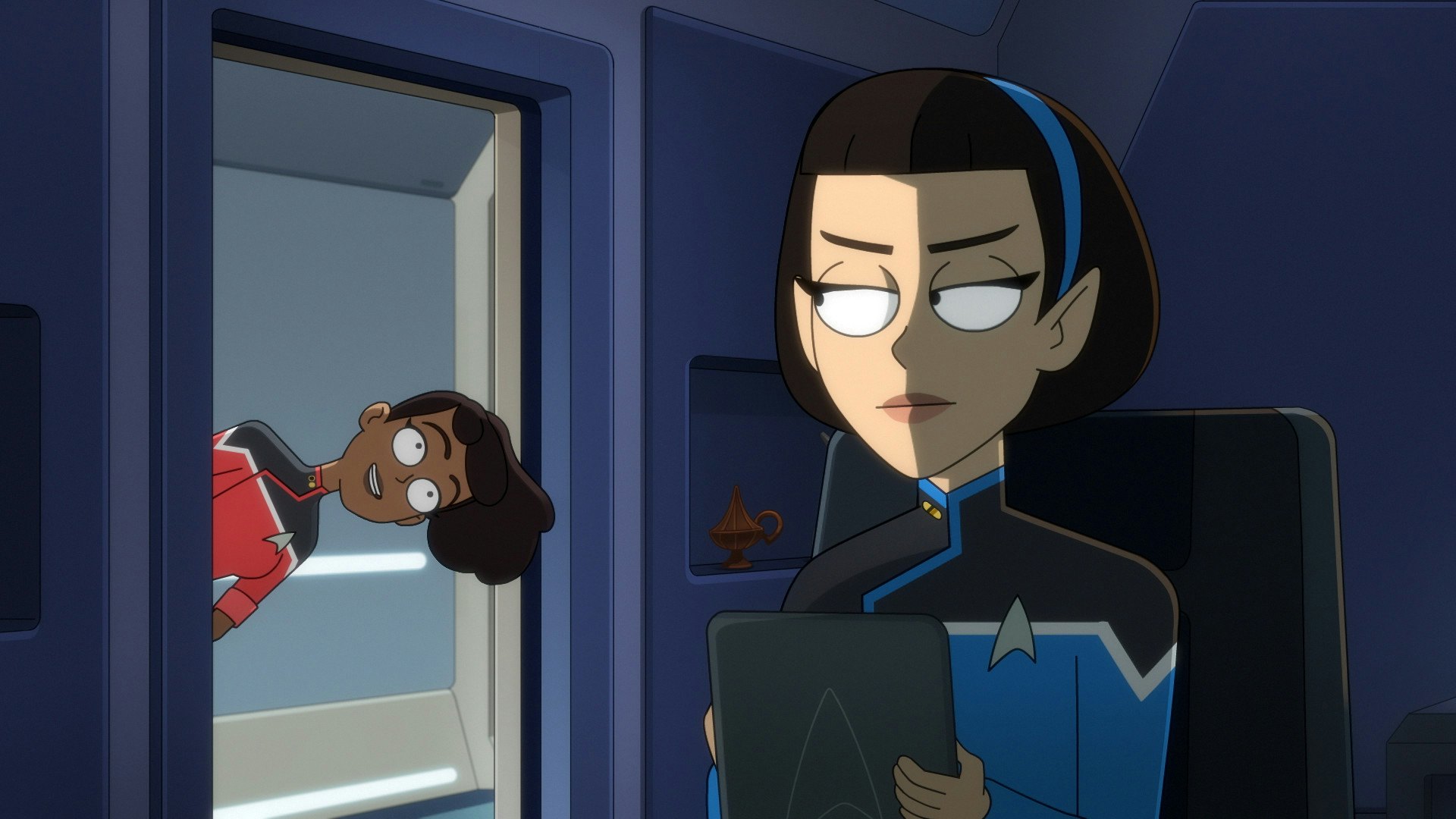
If Vulcans losing their logical, well-ordered minds is a Star Trek trope as old as Trek itself, then the slightly more fun trope is when Vulcans go so bonkers they cause other people to lose their minds. In the 1990 Next Generation episode “Sarek,” Spock’s dad sent waves of telepathic chaos throughout the Enterprise-D. At the time, Sarek’s mental projections and their subsequent impact on the Enterprise crew was a great twist. Now, 33 years later, Star Trek found a new way to use this trope. And in doing so, Vulcans just got even more interesting. Spoilers ahead for Lower Decks Season 4, “Empathalogical Fallacies.”
Throughout most of “Empathalogical Fallacies,” the story leads the audience into thinking there’s one type of telepathic projection virus happening, when a totally different telepathic virus is the true culprit. When the crew starts acting irrationally, T’Lynn theorizes three visiting Betazoids have Zanthi fever, and are projecting their emotions onto everyone around them. Zanthi fever comes from the Deep Space Nine episode “Fascination,” in which Lwaxana Troi projected her emotions onto the entire station. “Empathological Fallacies” leads us to believe that Lower Decks is recycling the story, but exaggerating it for comedy. That’s what the show already did in the Season 4 premiere, “Twovix,” which cranks the premise of Voyager’s “Tuvix” up to 11.
But late in the episode, Lower Decks reveals that it’s been tricking us. The visiting party girl Betazoids don’t have Zanthi fever; they’re actually on a secret spy mission. Instead, the massive emotional outbursts are the result of the one character who’s close to having no emotions at all, resident Vulcan officer T’Lynn (Gabrielle Ruiz). Instead of Zanthi fever messing with everyone, it turns out the crew is actually being plagued by Bendii Syndrome.

It’s here where Lower Decks expands Vulcan canon in an interesting way. In “Sarek” and the later TNG episode “Unification I,” we see Sarek crumble into mood swings that present as dementia. In “Sarek,” this volatile mental state makes the crew of the Enterprise turn on each other. But the clue is that Sarek himself is angry and crying. In TNG, Bendii Syndrome stemmed from Sarek not acting like a “regular” Vulcan. But in “Empathalogical Fallacies,” T’Lynn is behaving very much like herself, meaning no one could see Bendii Syndrome coming.
On top of that, T’Lynn is young, at least relative to Sarek in TNG. When T’Lynn realizes she’s the cause of the emotional chaos, it’s a moment of validation. In Season 2, T’Lynn was kicked off of an all-Vulcan starship because she was branded not logical enough. But here, by contracting an infamous Vulcan virus, she’s suddenly very much in touch with her culture. As Mariner (Tawny Newsome) says, “Can you imagine anything more Vulcan than Bendii Syndrome? I mean, hello, Spock’s dad had it, and he was Vulcan as a motherf***er.”
The Vulcan culture is one of the most enduring alien societies in sci-fi. The ins and outs of Vulcan society have largely been explored through Spock, but other Vulcans, like Saavik, Tuvok, T’Pol, and T’Pring, have added detail and variety to the tapestry of the most logical people in the Final Frontier. Now, with T’Lynn, the emotional projections of Vulcans are more unpredictable than ever, which ironically makes the state of being Vulcan more realistic than ever.
Lower Decks streams on Paramount.+
Phasers on Stun!: How the Making — and Remaking — of Star Trek Changed the World








